In this Saturday, Oct. 22, 2016 photo, a man pays his bill as his friend smokes a waterpipe, or shisha, at a cafe in Cairo, Egypt. On Thursday, Nov. 3, 2016, Egypt devalued its currency by 48 percent, meeting a key demand set by the International Monetary Fund in exchange for a $12 billion loan over three years to overhaul the country's ailing economy. The much heralded decision by the Egyptian Central Bank to devalue the pound followed a sharp and sudden decline this week in the value of the dollar in the unofficial market, plunging from an all-time high of 18.25 pounds to around 13 to the U.S. currency. (AP Photo/Nariman El-Mofty)
The Associated Press
CAIRO (AP) - Egypt on Thursday took the unprecedented step of floating its currency and later hiked fuel prices, meeting key demands by the International Monetary Fund under a $12 billion loan agreement to overhaul the ailing economy of the most populous Arab state.
The floatation, accompanied by a 48 percent devaluation of the Egyptian pound, is the boldest economic measure taken by President Abdel-Fattah el-Sissi since his election in 2014. For the first time, Egypt's currency will fluctuate according to supply and demand. El-Sissi has often asserted that tough times lie ahead as the country struggles with an array of economic woes, from double-digit inflation to unemployment and an acute foreign currency shortage.
At midnight Thursday, fuel prices were hiked, with gasoline, diesel and the infrequently used natural gas all going up between 30 and 46.8 percent, according to state media. Past fuel price hikes had a far reaching knock-on effect, triggering a matching increase in food and transport prices. Word of Thursday's hikes was leaked late at night, sparking a rush by motorists to gas stations, where long lines of vehicles formed across much of the country.
The Central Bank said in a statement the floatation would "completely end" the black currency market and "empower the Egyptian economy to face the present challenges, unleash its potential and achieve the hoped-for growth."
Central Bank Governor Tareq Amer was upbeat when he addressed a news conference, saying "this is a big turning point in the Egyptian economy. We could not tolerate dual (foreign currency) markets continuing."
It may, however, be too early for the government to declare victory in its battle against the unofficial currency market, which has for decades served as a lifeline for a private sector that heavily depends on dollars to finance imports, given longstanding limits on foreign currency withdrawals on the official market and the recent dollar shortage.
"The floatation is an excellent, overdue step that, thank God, we took," Egypt's business tycoon Naguib Sawiris wrote on his Twitter account. "We must all help to make this step a success."
One of the most pressing concerns facing el-Sissi's government is avoiding a popular backlash as the price of goods and services rise in response to the fall in the pound's value and the hike in fuel prices.
El-Sissi in 2014 partly lifted fuel subsidies, a measure none of his predecessors have dared implement, but faced only small protests. This may be partly due to his government's crackdown on dissent. Authorities have in recent weeks detained dozens of Islamists they say are planning street protests on Nov. 11 against the government's handling of the economy.
The banned Muslim Brotherhood group condemned the pound's floatation, saying it would "crush the bones" of millions of Egyptians already struggling to make ends meet.
"The people of Egypt must unite and rise up for the future of Egypt and its children," the Islamist group said in a statement, without specifying a date for the protests.
Egypt's economic troubles began with the 2011 popular uprising that toppled autocrat Hosni Mubarak. The turmoil and violence that followed have weakened the economy, scaring away investors and foreign tourists and unleashing a wave of industrial unrest.
At the same time, an insurgency by Islamic militants in the Sinai Peninsula has significantly picked up pace since the 2013 military ouster of an Islamist president, the Brotherhood's Mohammed Morsi. Last year's downing of a Russian passenger jet over Sinai, which killed all 224 on board, dealt a devastating blow to tourism.
Thursday's devaluation pegged the Egyptian pound at 13 to the dollar, down from 8.8 pounds on the official market. By the afternoon, banks were selling the dollar at 14.30 pounds, and buying the U.S. currency for 13.
The Central Bank also raised two key interest rates by three percentage points on Thursday, in an apparent bid to contain inflation and encourage investors to hold on to their pounds.
Seeking to calm nerves at a time of economic tumult, the Bank said it would guarantee bank deposits in all currencies and that individuals and companies would face no restrictions in depositing and withdrawing foreign currency. Banks would be allowed to operate until 9 p.m. and open on weekends to buy and sell foreign currency, it added. Banks in Egypt are normally open to the public until 5 p.m. and close on the Friday-Saturday weekend.
Shares on the Egyptian stock market rallied on the back of the measures, with the benchmark EGX30 index closing 3.35 percent higher.
A number of analysts welcomed the move. Angus Blair, an economist with the Cairo-based Pharos Bank, dismissed fears of significant price rises as a result of the floatation, arguing that the depreciation of the Egyptian pound in recent months has already done most of the damage. "Inflation is already high and it is endemic in Egypt," he said.
Emad Mostaque, a London-based strategist who closely follows the Egyptian economy, said the floatation had averted an Egyptian economic crisis over the shortage of foreign currency and the crippling devaluation of the pound on the unofficial market. Last week, the black market exchange rate was around 18.5 Egyptian pounds to the dollar, more than double the official rate. The soaring value of the dollar led to a range of shortages, from medicines to electrical appliances and imported chocolates.
"If they had not done that today, the economy would have soon ground to a complete halt," he said in a telephone interview. "The move is long overdue, but structural issues with the economy remain to be resolved."
The IMF's executive board has yet to ratify the $12 billion loan provisionally agreed by Egypt and the lender-of-last-resort in August, but Chris Jarvis, the IMF mission chief in Egypt, gave the day's development the nod, saying the floatation would enhance the country's "external competitiveness, support exports and tourism and attract foreign investment."
Egypt has already reduced subsidies on household electricity this year and moved this week to increase by 40 percent the price of sugar for ration card holders. It introduced a 13 percent value added tax in September.
Thursday's developments came just two days after the Supreme Investment Council, a newly formed body led by el-Sissi, approved a package of measures designed to spur the economy, including a three-year freeze on taxing capital gains on stocks and an unspecified increase in the number of state-owned companies to be partially privatized.
___
Associated Press writer Maggie Michael contributed to this report from Cairo.
In this Wednesday, Nov. 2, 2016 photo, a woman shops at a supermarket in Cairo, Egypt. On Thursday, Nov. 3, 2016, Egypt devalued its currency by 48 percent, meeting a key demand set by the International Monetary Fund in exchange for a $12 billion loan over three years to overhaul the country's ailing economy. The much heralded decision by the Egyptian Central Bank to devalue the pound followed a sharp and sudden decline this week in the value of the dollar in the unofficial market, plunging from an all-time high of 18.25 pounds to around 13 to the U.S. currency. (AP Photo/Nariman El-Mofty)
The Associated Press

In this Tuesday, Oct. 18, 2016 photo, commuters ride a public bus as they wait in traffic, in Cairo, Egypt. On Thursday, Nov. 3, 2016, Egypt devalued its currency by 48 percent, meeting a key demand set by the International Monetary Fund in exchange for a $12 billion loan over three years to overhaul the country's ailing economy. The much heralded decision by the Egyptian Central Bank to devalue the pound followed a sharp and sudden decline this week in the value of the dollar in the unofficial market, plunging from an all-time high of 18.25 pounds to around 13 to the U.S. currency. (AP Photo/Nariman El-Mofty)
The Associated Press

In this Thursday, Oct. 27, 2016 photo, Egyptian women exit a metro station in Cairo, Egypt. On Thursday, Nov. 3, 2016, Egypt devalued its currency by 48 percent, meeting a key demand set by the International Monetary Fund in exchange for a $12 billion loan over three years to overhaul the country's ailing economy. The much heralded decision by the Egyptian Central Bank to devalue the pound followed a sharp and sudden decline this week in the value of the dollar in the unofficial market, plunging from an all-time high of 18.25 pounds to around 13 to the U.S. currency. (AP Photo/Nariman El-Mofty)
The Associated Press
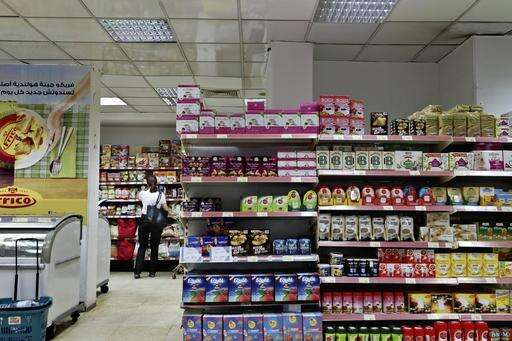
In this Wednesday, Nov. 2, 2016 photo, a woman shops at a supermarket in Cairo, Egypt. On Thursday, Nov. 3, 2016, Egypt devalued its currency by 48 percent, meeting a key demand set by the International Monetary Fund in exchange for a $12 billion loan over three years to overhaul the country's ailing economy. The much heralded decision by the Egyptian Central Bank to devalue the pound followed a sharp and sudden decline this week in the value of the dollar in the unofficial market, plunging from an all-time high of 18.25 pounds to around 13 to the U.S. currency. (AP Photo/Nariman El-Mofty)
The Associated Press
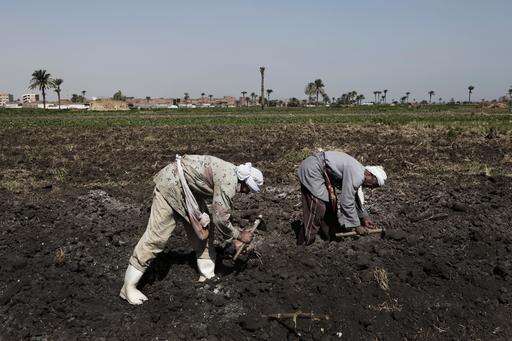
In this Wednesday, Oct. 19, 2016 photo, Egyptian farmers plant sugar beet seeds, in Beni Suef 75 miles, (120 kilometers), south of Cairo, Egypt. On Thursday, Nov. 3, 2016, Egypt devalued its currency by 48 percent, meeting a key demand set by the International Monetary Fund in exchange for a $12 billion loan over three years to overhaul the country's ailing economy. The much heralded decision by the Egyptian Central Bank to devalue the pound followed a sharp and sudden decline this week in the value of the dollar in the unofficial market, plunging from an all-time high of 18.25 pounds to around 13 to the U.S. currency. (AP Photo/Nariman El-Mofty)
The Associated Press

In this Saturday, Oct. 22, 2016 photo, used clothing is displayed in Wekalet El Balah fabric market, in Egypt. On Thursday, Nov. 3, 2016, Egypt devalued its currency by 48 percent, meeting a key demand set by the International Monetary Fund in exchange for a $12 billion loan over three years to overhaul the country's ailing economy. The much heralded decision by the Egyptian Central Bank to devalue the pound followed a sharp and sudden decline this week in the value of the dollar in the unofficial market, plunging from an all-time high of 18.25 pounds to around 13 to the U.S. currency. Arabic on sign at center reads, "35 L.E. without bargaining." (AP Photo/Nariman El-Mofty)
The Associated Press

In this Saturday, Oct. 22, 2016 photo, an Egyptian woman looks at imported fabric from China in Wekalet El Balah, Cairo's famous fabric market, in Egypt. On Thursday, Nov. 3, 2016, Egypt devalued its currency by 48 percent, meeting a key demand set by the International Monetary Fund in exchange for a $12 billion loan over three years to overhaul the country's ailing economy. The much heralded decision by the Egyptian Central Bank to devalue the pound followed a sharp and sudden decline this week in the value of the dollar in the unofficial market, plunging from an all-time high of 18.25 pounds to around 13 to the U.S. currency. (AP Photo/Nariman El-Mofty)
The Associated Press
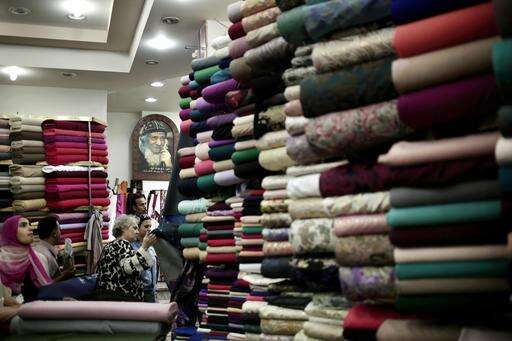
In this Saturday, Oct. 22, 2016 photo, Egyptian women look at fabric inside a store in Wekalet El Balah, Cairo's famous fabric market, in Egypt. On Thursday, Nov. 3, 2016, Egypt devalued its currency by 48 percent, meeting a key demand set by the International Monetary Fund in exchange for a $12 billion loan over three years to overhaul the country's ailing economy. The much heralded decision by the Egyptian Central Bank to devalue the pound followed a sharp and sudden decline this week in the value of the dollar in the unofficial market, plunging from an all-time high of 18.25 pounds to around 13 to the U.S. currency. (AP Photo/Nariman El-Mofty)
The Associated Press
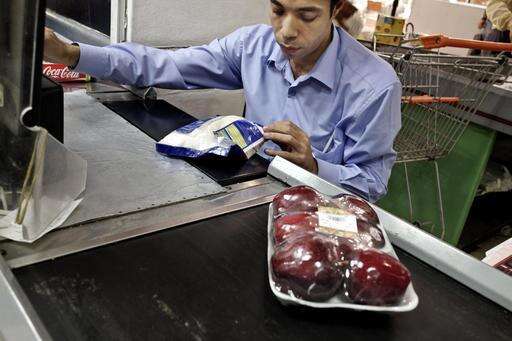
In this Wednesday, Nov. 2, 2016 photo, a cashier punches in the price of a bag of sugar at a supermarket in Cairo, Egypt. On Thursday, Nov. 3, 2016, Egypt devalued its currency by 48 percent, meeting a key demand set by the International Monetary Fund in exchange for a $12 billion loan over three years to overhaul the country's ailing economy. The much heralded decision by the Egyptian Central Bank to devalue the pound followed a sharp and sudden decline this week in the value of the dollar in the unofficial market, plunging from an all-time high of 18.25 pounds to around 13 to the U.S. currency. (AP Photo/Nariman El-Mofty)
The Associated Press
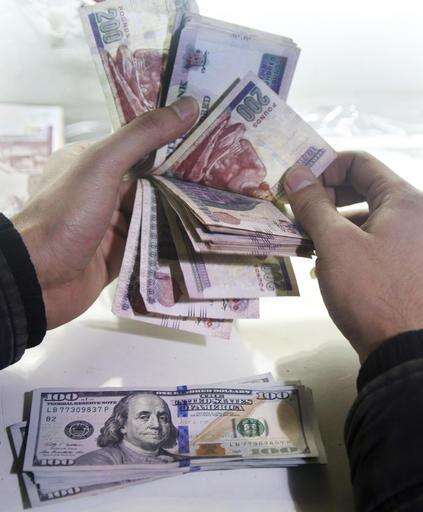
FILE -- In this March 14, 2016 file photo, a man counts Egyptian currency at an exchange office in Cairo, Egypt. On Thursday, Nov. 3, 2016, Egypt devalued its currency by nearly 50 percent, meeting a key demand set by the International Monetary Fund in exchange for a $13 billion loan over three years to overhaul the countryâs ailing economy. Thursdayâs much heralded decision by the Egyptian Central Bank to devalue the pound followed a sharp and sudden decline this week in the value of the dollar in the unofficial market, plunging from an all-time high of 18.25 pounds to around 13 to the U.S. currency. (AP Photo/Amr Nabil, File)
The Associated Press